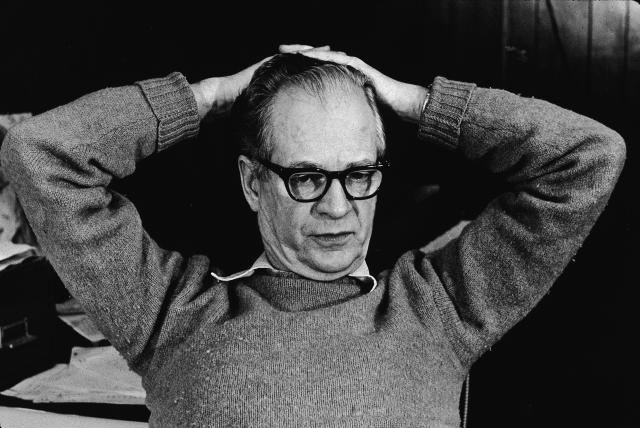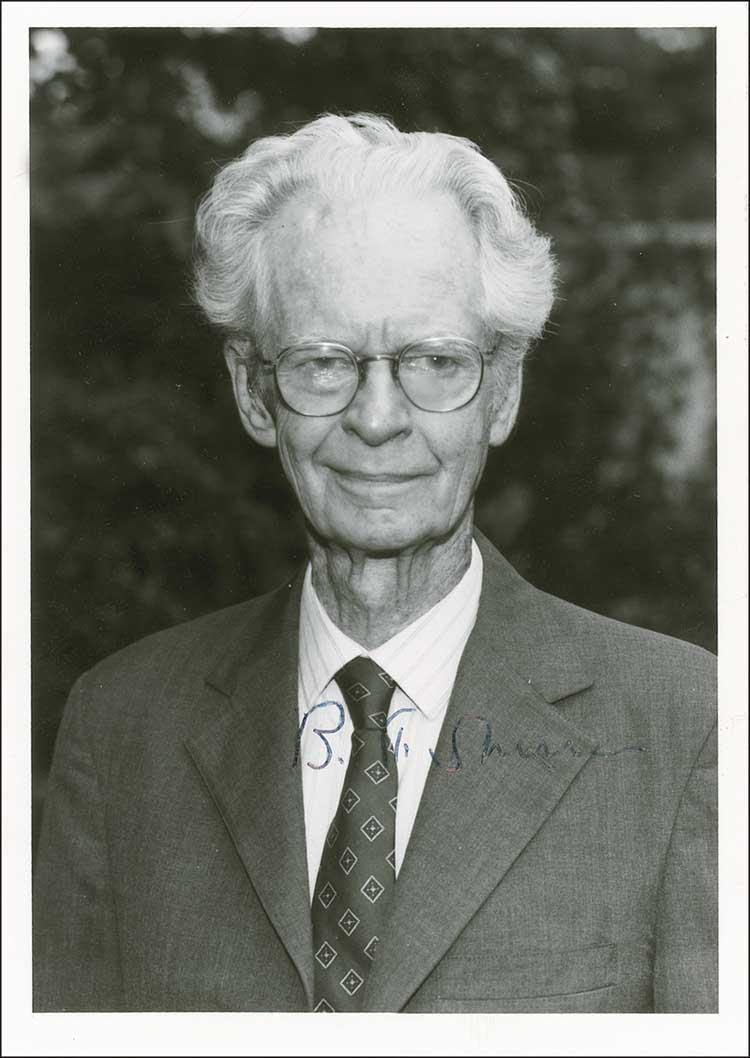“We shouldn’t teach great books; we should teach a love of reading. Knowing the contents of a few works of literature is a trivial achievement. Being inclined to go on reading is a great achievement.”
― B.F. Skinner
| Born | 20 March 1904 Susquehanna, Pennsylvania |
|---|---|
| Died | 18 August 1990 (aged 86) Cambridge, Massachusetts |
| Nationality | American |
| Fields | Psychology, linguistics,philosophy |
| Institutions | University of Minnesota Indiana University Harvard University |
| Alma mater | Hamilton College Harvard University |
| Known for | Operant conditioning operant conditioning chamber radical behaviorism |
| Influences | Charles Darwin Ivan Pavlov Ernst Mach Jacques Loeb Edward Thorndike William James Jean-Jacques Rousseau Henry David Thoreau |
| Notable awards | National Medal of Science (1968) |
| Signature | |
Burrhus Frederic Skinner (March 20, 1904 – August 18, 1990), commonly known as B. F. Skinner, was an American psychologist, behaviorist, author, inventor, and social philosopher. He was the Edgar Pierce Professor of Psychology at Harvard University from 1958 until his retirement in 1974.
Skinner considered free will an illusion and human action dependent on consequences of previous actions. If the consequences are bad, there is a high chance that the action will not be repeated; however if the consequences are good, the actions that led to it will become more probable. Skinner called this the principle of reinforcement.
Skinner called the use of reinforcement to strengthen behavior operant conditioning, and he considered the rate of response to be the most effective measure of response strength. To study operant conditioning he invented the operant conditioning chamber, also known as the Skinner Box, and to measure rate he invented the cumulative recorder. Using these tools he and C. B. Ferster produced his most influential experimental work, which appeared in the book Schedules of Reinforcement.
Skinner developed a philosophy of science that he called radical behaviorism, and founded a school of experimental research psychology—the experimental analysis of behavior. He imagined the application of his ideas to the design of a human community in his utopian novel Walden Two, and his analysis of human behavior culminated in his work Verbal Behavior.
Skinner was a prolific author who published 21 books and 180 articles. Contemporary academia considers Skinner a pioneer of modern behaviorism along with John B. Watson and Ivan Pavlov.
A June 2002 survey listed Skinner as the most influential psychologist of the 20th century.
–
B. F. Skinner – About Behaviorism (1977)
–
B. F. Skinner on education
–
Quotes
“A failure is not always a mistake, it may simply be the best one can do under the circumstances. The real mistake is to stop trying. ”
–
“The only geniuses produced by the chaos of society are those who do something about it. Chaos breeds geniuses. It offers a man something to be a genius about.”
–
“Education is what survives when what has been learnt has been forgotten.”
–
“A fourth-grade reader may be a sixth-grade mathematician. The grade is an administrative device which does violence to the nature of the developmental process.”
–
“No one asks how to motivate a baby. A baby naturally explores everything it can get at, unless restraining forces have already been at work. And this tendency doesn’t die out, it’s wiped out.”
–
“We are only just beginning to understand the power of love because we are just beginning to understand the weakness of force and aggression.”
–
“Some of us learn control, more or less by accident. The rest of us go all our lives not even understanding how it is possible, and blaming our failure on being born the wrong way.”
–
“The real question is not whether machines think but whether men do. The mystery which surrounds a thinking machine already surrounds a thinking man.”
–
“A person who has been punished is not thereby simply less inclined to behave in a given way; at best, he learns how to avoid punishment.”
–
“At this very moment enormous numbers of intelligent men and women of goodwill are trying to build a better world. But problems are born faster than they can be solved.”
–
“If freedom is a requisite for human happiness, then all that’s necessary is to provide the illusion of freedom.”
–
“A scientist may not be sure of the answer, but he’s often sure he can find one. And that’s a condition which is clearly not enjoyed by philosophy.”
–
“Society attacks early, when the individual is helpless. It enslaves him almost before he has tasted freedom. The ‘ologies’ will tell you how its done Theology calls it building a conscience or developing a spirit of selflessness. Psychology calls it the growth of the superego.
Considering how long society has been at it, you’d expect a better job. But the campaigns have been badly planned and the victory has never been secured.”
–
“We do not choose survival as a value, it chooses us.”
–
“Democracy is the spawn of despotism. And like father, like son. Democracy is power and rule. It’s not the will of the people, remember; it’s the will of the majority.”
–
“Men build society and society builds men.”

